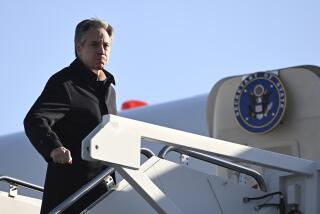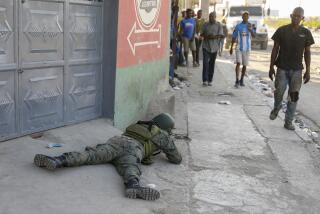Thousands Flee Terror by Militias in E. Timor : Asia: A massacre of pro-independence supporters is taking place, an envoy reports. As Indonesia’s military remains passive, U.N. plans to send a delegation to Jakarta seeking answers.
- Share via
JAKARTA, Indonesia — Armed anti-independence gangs killed scores of people in East Timor on Sunday, a diplomat said, and attacked and set fire to the downtown hotel in the provincial capital where U.N. staff and a few remaining foreign journalists were staying.
Hundreds of residents, meanwhile, jammed the harbor in the capital, Dili, looking for a ship to safety, or headed into the mountains on foot, carrying rice and a few possessions. All told, tens of thousands of people were reported to be fleeing.
The gangs, which refer to themselves as militias, are under the command of the Indonesian military, Western diplomats say, and have sought to take control of the province, whose people voted overwhelmingly in a United Nations-sponsored election last week to end a forced quarter-century association with Indonesia and become independent.
Ana Gomes, a Portuguese envoy to Indonesia, told CNN that she had reports of “scores of wounded, scores of killed.” She said independence supporters throughout East Timor, a former Portuguese colony, were in grave danger “from orchestrated chaos by military forces, sinister forces,” and called on the U.N. to stop the violence.
“All the information indicates that a massacre is taking place,” Gomes told Portugal’s TSF Radio. She said that Indonesian soldiers were turning wounded civilians away from hospitals and that the mayhem was being supervised by the army’s elite Kopassus unit--an assessment shared by most other Western envoys.
The intent of the gunmen, who roam and kill freely under the passive gaze of Indonesian soldiers and police, appears to be to drive all election observers, U.N. staff and journalists out of East Timor so that they can punish and kill at will those supporting independence. They are well on their way to achieving that goal, diplomats said.
The militias’ disregard of federal authority was evident in the fact that some of the violence occurred even as Indonesian Defense Minister Gen. Wiranto, three other Cabinet ministers and the national police chief were in Dili on a four-hour visit to assess security. Three of the ministers did not leave the airport.
Justice Minister H. Muladi said the delegation wanted “to strengthen law and order . . . because Indonesia’s reputation is at stake.” But despite public condemnations and much hand-wringing, the international community has responded to East Timor’s slide into anarchy only by warning that Indonesia faces consequences if it does not stop the bloodshed.
The State Department faulted the Indonesian government Sunday for failing to take “effective action to control armed militia.”
The department said in a statement that it welcomed the visit to the province by the high-level Indonesian delegation. But it added: “Failure to restore order will inevitably affect Indonesia’s international reputation.”
At U.N. headquarters in New York, the Security Council met in urgent consultations and decided to dispatch a mission to Jakarta, the Indonesian capital, to emphasize that the democratic process in East Timor must continue and the violence must end.
Plans called for the delegation of perhaps five council members to leave as quickly as possible.
Ambassador Arnold Peter van Walsum of the Netherlands, the Security Council’s president, said the mission will discuss with the Indonesian government “concrete steps to allow the peaceful implementation of the ballot result.”
“The government of Indonesia has welcomed this intention,” he said.
“Obviously we are appalled by all this recent violence. . . . We think we have to do everything we can to bring that message home to them,” said Canadian U.N. Ambassador Robert R. Fowler.
“There are persistent reports the Indonesian army and police authorities are not only passive with respect to this violence. There are repeated reports that they are actively colluding in it,” Fowler said. “We have to do what we can to stop that.”
In the corridor outside the Security Council’s chamber, Jose Ramos-Horta, an advocate of East Timorese independence, charged that the violence was being “orchestrated by hard-liners in the Indonesian army” with an economic stake in the territory.
Ramos-Horta, co-winner of the 1996 Nobel Peace Prize, called for independent peacekeepers to be sent to East Timor and for the World Bank and the International Monetary Fund to freeze funding for Indonesia.
Diplomats said the thorny question of organizing a U.N. peacekeeping force did not come up during the consultations. China, which has veto power in the council, is believed to be opposed to sending peacekeepers.
Wiranto and other members of the Indonesian government, including President B. J. Habibie, have made numerous unfulfilled pledges that the East Timorese will be protected. The U.N. has repeatedly appealed for security guarantees, but “increasingly those appeals seem to be falling on deaf ears,” U.N. spokesman David Wimhurst said in Dili.
By Sunday, most foreign journalists in the province--about 130 of them--had joined the mass exodus out of Dili on charter flights. And Australia announced that it would launch an evacuation today of nonessential U.N. staff and Australians. Other foreigners are likely to be part of that airlift.
“The people who lost the election should recognize that they lost fair and square,” President Clinton said over the weekend, expressing hope that the Habibie government would exert influence to control security in East Timor and rein in the armed gangs, many of whom are not only recruited and trained but paid by the Indonesian military.
But the United Front for East Timor Autonomy, an umbrella group that embraces 13 anti-independence militias, announced Sunday that it was formally rejecting the election results. It accused the U.N. of bias and said the election--which was carried out by U.N. workers from 70 nations--was not honest, fair or open.
Many political analysts had worried that a vote for independence would spark civil war. Those fears have passed for now because the gunmen face no opposition. What is happening is not civil war but simply the killing and intimidation of unarmed civilians by the one side that is able to act with impunity.
However, the military commander of the Falantil pro-independence movement, Taur Matan Ruak, said in Portugal that his guerrillas might resume the civil war. Falantil, which fought Indonesia on and off for 24 years, has for months been in a defensive position in the mountains of East Timor.
“If things get worse, it will be chaos, and we will respond to it at a national level,” Ruak told Lisbon’s Radio Renascenca. “Our patience is running out.” Guerrillas, he said, would fight with “chains, stones, weapons, anything they have in their hands.”
More than 25,000 Timorese around Dili have sought refuge in churches, police stations and the U.N. compound. At least 3,000 fled Sunday on two Indonesian warships and a passenger ship, and others left on four chartered flights. Diplomats warned of serious food shortages for those staying behind.
Dozens of houses were set afire in Dili neighborhoods over the weekend, and the western town of Maliana was said to have been razed after the U.N. was forced to withdraw its staff.
Numerous reports of massacres throughout the territory could not be confirmed by human rights activists because militia roadblocks restricted travel.
*
Times staff writers John J. Goldman at the United Nations and Melissa Healy in Washington contributed to this report.
More to Read
Sign up for Essential California
The most important California stories and recommendations in your inbox every morning.
You may occasionally receive promotional content from the Los Angeles Times.










